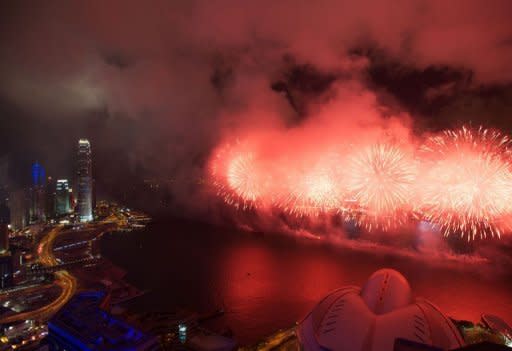Huge demo as Hong Kong marks 15 years under China
Hong Kong's biggest protest for nearly a decade packed the former British colony's streets in a defiant reception for its new leader and a show of popular anger after 15 years of Chinese rule. The vast rally came after Leung Chun-ying, a millionaire property consultant seen as close to China's communist authorities, was sworn in as chief executive in front of Chinese President Hu Jintao -- who had his speech interrupted. Hu's visit and Leung's inauguration have become focal points for growing discontent towards Beijing, which has surged to a new post-handover high amid soaring housing costs, limited democracy and perceived meddling by China. "Hong Kong has become much worse off," Eric Lai of the Civil Human Rights Front told the marchers. "Our rights are under serious threat." Organisers put the crowd at 400,000, their largest claimed turnout for eight years and almost twice their number last year. But police said only 63,000 attended -- although that was also their largest figure for eight years. The July 1 marches marking Hong Kong's handover have become an annual fixture since 2003, when 500,000 people showed their fury over a security bill and economic downturn, a key factor in the then chief executive Tung Chee-hwa stepping down the following year. Sunday's crowd ranged from engineers and civil servants to maids and students, and represented groups from the Falun Gong spiritual movement to trade unions, as well as ordinary citizens young and old. In sweltering heat the last of them reached their destination almost six hours after the first marchers set out, and along the way they blocked streets far across the city, stranding buses and trams as they surrounded them. Mostly clad in the mourning colours of black and white, they carried placards calling for "One person one vote" and chanted "Power to the people", sometimes in more of a carnival atmosphere, complete with drums and songs. The financial centre enjoys significant autonomy and civil liberties unheard of on the mainland under the "one country, two systems" model covering its return to China in 1997 after more than a century of British rule. But marcher Jacky Lim, 37, who carried Hong Kong's former colonial flag bearing the British union jack, said: "There is nothing worth celebrating today. Hong Kong is being gradually destroyed by the Communist Party. "The direct interference of Beijing in the election of Leung Chun-ying is a clear example," he said. Hong Kong does not yet choose its leader by universal suffrage, and Leung was elected as chief executive in March by a committee stacked with pro-Beijing business elites. A spokesman for the Hong Kong government said it "fully respected" freedom of expression and the right to "take part in processions", and would listen to the demonstrators' views "in a humble manner". Earlier, as President Hu began his speech to around 2,300 guests at Leung's inauguration, a protestor inside the harbourfront venue repeatedly shouted "End one-party rule". The man also referred to the Tiananmen Square protests of 1989 in Beijing, and was rapidly bundled away by security personnel, while the audience drowned him out with extended applause for Hu. Beijing's support for "one country, two systems" and the right of Hong Kongers to rule the territory was "unwavering", said Hu. "We will follow the Basic Law... to continue to advance democratic development in Hong Kong," said the president, who will step down as part of a once-in-a-decade leadership transition in Beijing starting later this year. Hu -- who said Friday he hoped to understand Hong Kongers' "life and expectations" -- left for Beijing before the march began. Stifling security was imposed for his three-day visit, with police using pepper spray on demonstrators at one point on Saturday, and briefly detaining a Hong Kong reporter who shouted a question about Tiananmen at Hu. Late on Sunday some 300 protesters held a demonstration outside the Beijing representative office in Hong Kong, burning copies of the city's mini-constitution before dispersing around midnight. China's economic rise has helped spur impressive growth in Hong Kong and boost the city's status, and supporters packed a stadium Sunday for a gala celebration featuring a People's Liberation Army parachute display. But tensions are growing between the seven million locals and their northern neighbours, with newly rich Chinese mainlanders accused of everything from pushing up property prices to monopolising maternity beds. A poll released by Hong Kong University last week showed mistrust towards Beijing at 37 percent, a post-handover high, and the number of Hong Kongers identifying themselves primarily as citizens of China plunged to a 13-year low in another survey. There are also complaints about a widening gap between rich and poor and Leung has promised to tackle the grievances but ahead of his swearing-in, a group of demonstrators burned his portrait. "If we work together, I am sure Hong Kong -- the Pearl of the Orient -- will sparkle again," Leung said in his speech.




